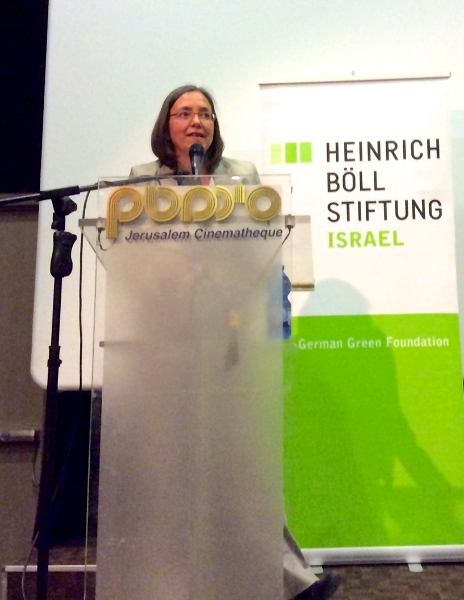A Chance for Change was the latest in a series of ‘Jerusalem Talks’ held by the Heinrich Böll Foundation at Jerusalem’s Cinematheque. The panelists included former Meretz Member of Knesset and Deputy Knesset Speaker Naomi Chazan, retired Israel Defense Forces general and President of the Council for Peace and Security Nathan Sharoni, and Mossawa Center di-rector Jafar Farrah. The program aimed to discuss a ‘turning point in Israeli politics’, especially given the early parliamentary elections being held on March 17th. Special attention was also paid to the ‘political impact of Israel’s Arab citizens’. The event was opened by Kirsten Mueller, Director of the Heinrich Böll Foundation Tel Aviv. It was moderated by German radio journalist Peter Kapern, and included the participation of German foreign correspondent Torsten Teichmann.
Smelling the seeds of spring
The panel opened on a buoyant note with Sharoni remarking that the dissatisfaction of the Is-raeli public with Prime Minister Netanyahu’s government was such that he could “smell the seeds of spring”. “There is a lot of anger about non-performance of the government in the last 5 years”, Sharoni said. He cited the government’s inaction in fighting soaring housing costs and its inability to “create any [peace] initiative of any nature” as reasons that Israelis are yearning to vote in a new prime minister after a half decade of inaction by Netanyahu.
Sharoni was seated next to Jafar Farrah, and watching the interaction between the two; one a retired general in the Israeli army and one a Palestinian citizen of Israel - the director of a center advocating equality for Arab citizens within Israeli borders, was fascinating. They joked with each other, argued with each other, and patted each other on the arm with heart-warming fre-quency. Mr. Farrah disagreed with Sharoni from the beginning, explaining that from the Pales-tinian viewpoint, the right wing Likud-led government was not simply benign and inefficient but had spent much of the last decade building new settlements in the occupied West Bank, demol-ishing Palestinian homes, and waging three wars in the Gaza Strip. However, Mr. Farrah con-tributed to the optimism as well, saying that he wants the Joint Arab Party to be “part of the 61 (referencing the number of seats needed to form a coalition in the Knesset) seeds to bring the spring”.

Nathan Sharoni and Jafar Farrah joked and argued with each other. Photo, Amina Nolte
“The most important elections in recent history”
Former Knesset Deputy Speaker Naomi Chazan began by saying that “every single election in Israel, someone stands up and says ‘these are the most important elections in recent history’”. After the disclaimer, she laughingly assured us that it was true this time as well, but that for the “first time since 1999 there was a credible alternative to the right” and that she thought that “Li-kud will not be the major party in this election”.
For all the talk of a flowery future, there was pessimism and skepticism as well. More than one panelist expressed their concern that even if Isaac Herzog replaces Benjamin Netanyahu as prime minister, the occupation will continue in the West Bank. Mr. Farrah took the opportunity to remind the crowd that the Israeli Labor party (of which Herzog is the leader) has been responsi-ble for a great deal of settlement building in the West Bank.
Former MK Chazan remarked that “there is an undercurrent of racism and anti-democracy in this country”. Sharoni one upped her and said that the racism and hatred in Israel is “not an un-dercurrent, that’s putting it mildly. It becomes a way of life and legislation follows… we have to fight it. It creates cracks in the bones of democracy”. Naftali Bennet, the leader of the right wing ‘Jewish Home’ party often accused of fomenting such feelings, caught some of Sharoni’s flack, who called him “appropriate in Italy in the 1930’s”.
Importance of the Joint Arab List
A great deal of attention was paid to the Joint Arab List which recently unified a hodge podge of Islamist, communist, and nationalist parties under one umbrella. Mr. Farrah commented that the Joint Arab List’s example of bringing together such vastly divergent parties “will challenge the debate in Israel and will encourage democracy in the Palestinian community”. Every panelist agreed that Arabs in Israel can’t reinvigorate the state’s democracy by themselves and that Jewish Israelis can’t do it by themselves either.
There was talk of Israeli-Palestinian reconciliation. Mr. Farrah and Mr. Sharoni discussed the alternative Israeli and Palestinian narratives of 1948, in which Israel fought a war of independ-ence which displaced nearly a million Arabs. “When you are right and I am right, that’s a trag-edy,” Sharon said. “We had to fight for our survival, you got kicked off your land. We have to resolve it so it does not become a Shakespearean tragedy where everyone dies at the end!” Farrah agreed, saying “the future should look different than history”.
Perhaps spring is closer than we think
Recent polls show Herzog’s Zionist Camp leading Netanyahu’s Likud by a seat and show the Joint Arab List winning 13 seats, positioning them to be the third largest party in the Knesset. It snowed two Saturdays ago in Jerusalem. About a half a foot of snow settled on the ground. This Saturday morning, I sat outside at a cafe for a few hours, enjoying the sun and 75 degree Fahrenheit weather. Perhaps the spring is closer than we think.

Kirsten Mueller, Director of the Heinrich Boll Foundation Tel Aviv and Former German Deputy Foreign Minister opened the event. Photo, Amina Nolte.
